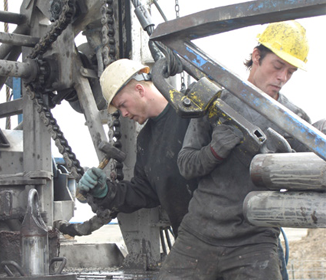What is the job description of a heavy duty mechanic? What are their day to day responsibilities? What knowledge, skills and abilities should a heavy duty mechanic possess? In a nutshell, a heavy duty mechanic is in charge of repairing and maintaining incredibly large and rugged vehicles and equipment. They work mostly with diesel engines and technology, as most heavy duty equipment uses these, rather than petrol engines. The industries a heavy duty mechanic works in can vary greatly. Some heavy duty mechanics work in forestry, mining, farming, logging, construction, marine, military, or in transportation. Full time heavy duty mechanics work from 9 to 5, five days a week, just like many other full time positions. Some work mostly indoors in a diesel mechanic repair shop. Others work outdoors or on-site most of the time.
In order to be a successful heavy duty mechanic, one needs to undertake proper training and education. This can be done at community colleges and vocational schools or institutions. Heavy duty mechanic training should provide basic mechanic skills and practice, as well as arm the future mechanics with the knowledge and abilities necessary to perform their daily responsibilities.
General Heavy Duty Mechanic Knowledge & Abilities
Some of the more general knowledge and abilities that a heavy duty mechanic should possess are:
- Mechanical Knowledge. Heavy duty mechanics must have knowledge of heavy machinery, equipment and diesel vehicles, including diesel engine design, maintenance and repair. Knowledge of both basic tools and specialized diesel mechanic tools.
- Knowledge of Diesel Technology. Diesel Technicians must all contain the ability to practically apply their knowledge of diesel science and technology. This includes applying methods, principles, techniques, and procedures learned during their training, education and apprenticeships.
- Knowledge of Computers and Electronics. Diesel engines and equipment are increasingly using computers and electronics. In addition, diesel mechanic tools are also increasingly computerized. As such, heavy duty mechanics must possess sound knowledge of electronic equipment and computer hardware and software. This includes circuit boards, processors, chips as well as various computer applications and programming.
- Analytical Skills and Forward Thinking. The best heavy duty mechanic is one that prevents problems and saves their clients money and hassle in the future. Therefore, a great diesel mechanic will not only analyze current problems and areas for repair, but will also recognize future potential problems and take appropriate steps in preventing them from occurring.
- Customer Service Skills. A heavy duty mechanic might seem quite rugged, but they also have to know how to have a ‘soft side’, too. When they aren’t under the hood or climbing on giant machinery, they need to be discussing issues, assessments, and problem solving with their clients. Diesel mechanics must know how to effectively explain the problem and the path to solution and repair in lay terms to their customers.
The daily responsibilities of a heavy duty mechanic will vary depending on what field or industry they work in. However, in general a heavy duty mechanic must know how to perform a variety of repairs and maintenance on heavy equipment and diesel engine vehicles.
Typical Heavy Duty Mechanic Repairs
Some of the typical repairs that a heavy duty mechanic must perform include:
- Repairing and servicing full systems such as air conditioning, heating, and engine-cooling systems.
- Repairing, replacing and adjusting brakes and brake systems.
- Rewiring lights, instrument panels, and other electrical systems.
- Repairing or replacing shock absorbers
- Repairing and rebuilding power systems and steering systems
- Repairing or replacing faulty parts such as pistons, gears, and valves
- Repairing both manual and automatic transmissions
- Overhauling, rebuilding or replacing generators, distributors, starters, pumps, crankshafts and cylinders
Typical Heavy Duty Mechanic Maintenance
Some of the typical maintenance jobs that a heavy duty mechanic should perform include:
- Performing routine and scheduled maintenance services like oil changes, lubrications, and tune-ups
- Following strict checklists to ensure all essential parts are in working order, including injectors, pumps, timing systems, brake and fuel systems, and any other potentially troublesome areas
- Testing and adjusting systems to meet manufacturers’ performance specifications
- Examining diesel equipment and vehicles for potential damage or malfunctions
- Testing and analyzing components and systems, using equipment such as engine analyzers, compression tests, and other computerized diagnostic tools
It clearly takes a lot of knowledge, abilities and skills to be a successful heavy duty mechanic. But for those people who love working with heavy machinery such as tractors, trucks, and marine or military equipment, being a heavy duty mechanic is a very fun and rewarding job.

